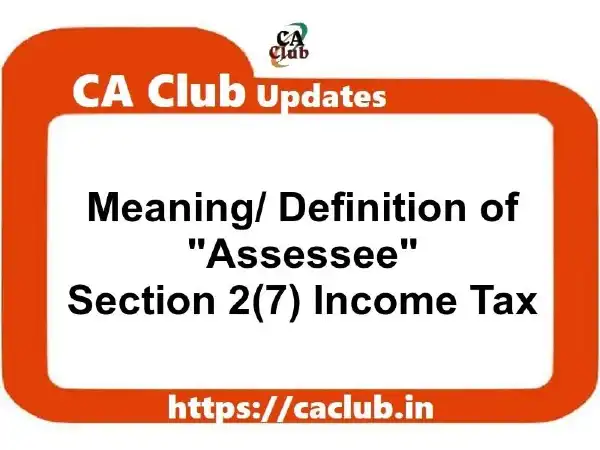As per S. 2(7) of the Income Tax Act, 1961, unless the context otherwise requires, the term “assessee” means a person by whom any tax or any other sum of money is payable under this Act, and includes,-
(a) every person in respect of whom any proceeding under this Act has been taken for the assessment of his income or assessment of fringe benefits or of the income of any other person in respect of which he is assessable, or of the loss sustained by him or by such other person, or of the amount of refund due to him or to such other person;
(b) every person who is deemed to be an assessee under any provision of this Act;
(c) every person who is deemed to be an assessee in default under any provision of this Act.
Types of Assessees under Income Tax
Generally, the term “assessee” is confused with “person” (i.e. Individual, HUF, AOP, BOI, Firm, LLP, Company, Local Authority, AJP, etc.) when attempting to comprehend its meaning under the Income Tax Act of 1961. According to the above definition, an “assessee” is someone who is liable for tax under the Income Tax Act. However, to fully grasp the meaning of “assessee,” it is important to also be familiar with the following:
A. Normal Assessee
i) any person against whom proceedings under Income Tax Act are going on, irrespective of the fact whether any tax or other amount is payable by him or not;
ii) any person who has sustained loss and filed return of loss u/s 139(3);
iii) any person by whom some amount of interest, tax or penalty is payable under this Act;
iv) any person who is entitled to refund of tax under this Act.
B. Representative Assessee
A person may be liable not only for the assessment of tax on his own income or loss, but also for the income or loss of others, such as an agent of a non-resident, a guardian of a minor or a lunatic, and so on. In such instances, the person responsible for tax on such person’s income is known as a representative assesses. Such an individual is deemed an assessee.
C. Deemed Assessee
i) In case of a deceased person who dies after writing his will the executors of the property of deceased are deemed as assessee.
ii) In case a person dies intestate (without writing his will) his eldest son or other legal heirs are deemed as assessee.
iii) In case of a minor, lunatic or idiot having income taxable under Income-tax Act, their guardian is deemed as assessee.
iv) In case of a non-resident having income in India, any person acting on his behalf is deemed as assessee.
D. Assessee-in-default
If a person fails to meet his statutory requirements, he is considered an assessee-in-default. For example, an assessee who fails to pay the demand u/s 156 in full within 30 days will be considered a ‘Assessee in Default,’ unless he obtains an Order Staying the Demand in due process. Until an assessee clears the demand/obligations in full, he will remain in default.
Furthermore, it is the responsibility of an employer paying a salary or a person paying interest to deduct tax at the source and deposit the amount of tax collected in the government treasury. He is regarded as an assessee-in-default if he fails to deduct tax at source or deducts tax but does not deposit it in the treasury.

minor and lunatic can be an assesee?
A minor and lunatic person are assessed to Income Tax thru their respective guardian (deemed assessee) or representative assessee of the guardian.
Is a representative assessee be always deemed assessee or a deemed assessee be always a representative assessee ?
In my view a representative assessee is always a deemed assessee. However a deemed assessee is not a representative assessee always.
Is there any definition of the term “lunatic” provided under Income-tax ACT? The provisions of Section 80U of the Income-tax Act are contradictory so long as a person of 18 years and above is mentally challenged and only source of income is interest earned from money deposited by parents for benefits of such mentally challenged person.
Kerala assessee meaning?
Is the deemed and representative assessee the same thing?
Is it necessary that to be called an assessee one should pay some amount to the income tax dept.? If a person who regularly files ITR every year (for the reason that his income is above the basic exemption limit) but escapes the tax net due to various deductions/ rebate, will he continue to be considered as an assessee under the Income Tax Act 1961?
@Sathish: There is no term such as ‘Kerala assessee’. May be an assessee having his/her residence or place of business or profession in Kerala or those who are liable to pay any tax as per any state tax laws are called like that.
Is the deemed and representative assessee the same thing?